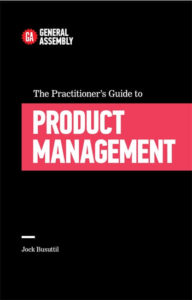
What skills do I need to be a freelance product manager?
People ask me from time to time about how they can get into freelance product management. Here’s a recent question:
Hi Jock,
I’ve been working as a product manager for 5 years now. I worked in different industries (financial, loyalty, media, fintech) and now I am starting to manage a team of product managers and setting up a product team as a senior product manager, as well as managing my own product.
I was thinking about starting consulting in 2-3 years of time. What are the skill sets I need to focus on and improve during this time period?
Thanks,
N
Read on for my reply.
Hi N,
One of the most useful skills will be the ability to get up to speed with a new product / market / company in days rather than weeks. The main difference between being employed and being a freelancer is that you don’t always have the luxury of time.
The trick is not so much about learning everything about the market, product or company in less time – there’s still a lot of information to take in – it’s more about seeing the similarities and patterns that will give you a head start.
There is a finite number of types of market and, broadly speaking, markets of the same type will have the same behaviours. For example, think about the characteristics of a traditional market such as Fintech being disrupted by new tech and new players. You might characterise that market as being made up of established players with legacy tech being challenged by relatively unknown new players, who are not weighed down by legacy tech and so can move faster and build trust.
So you can start to use your experience to build up a shorthand reference for types of market, which will help you get started more quickly.
The same goes for the type of product and type of company. Once you’ve established the broad pattern each is following, you’ll have a reasonable idea of the the potential problems and issues to think about, and then verify whether those are in fact problems for the specific product in the specific company you’re working.
Clearly your shorthands only get you started – you still need to get into the detail whan you start with a new client so you don’t accidentally over-generalise.
The next skill set to think about will be stakeholder management. In addition to the usual product management challenges, you are also managing a client’s expectations of you. They’re paying you a premium to deliver a result for them or to solve a particular problem for them. You need to be extra careful to communicate well to ensure your client knows what you’re doing and why.
In my experience at least, most of my clients know enough to realise that they don’t really understand product management as it is now practised. This can lead to a weird paradox where the client brought you in to be a product management expert, but then resents being shown that they need to change what they’re doing to become better at product management.
In other words, “We know we need to change, but we don’t really want to.”
These situations can be a bit intractable. Sometimes you can demonstrate some benefits relatively quickly and use that to relax your client into allowing more change to happen.
Sometimes you bump up against founders who actually just want you to tell them they’re doing great at product management (usually when they’re not). These can be difficult to deal with because they genuinely have no interest in doing anything differently.
So managing your clients is another important skill.
Don’t be afraid to “fire” bad clients. If you’re in a situation where the client simply doesn’t see any value in what you’re doing (assuming you’re doing your job well), then in the eyes of your client you’ll always underperform to their (unrealistic) expectations. In extreme situations, this can then mean a dispute over whether they actually pay your invoices.
This brings us on to risk management. As a freelancer, you’re quite exposed. Unlike an employee at a company, your advice can come back to haunt you. As a minimum you’ll need professional indemnity insurance (for when you screw up or are accused of screwing up) and public liability insurance.
You should consider setting up a limited company to separate “you” as a legal entity from “your company”. If someone sues you, they should be suing your company, not you personally. If you end up having to pay out, this would then come from your company, not from you personally. You should have a clear contract with each of your clients spelling out your respective responsibilities, what you will and won’t be doing for them, for how long and for what fees.
The next skill you’ll need will be marketing – of you and your company. If you’ve got a well-established network of contacts and you let them know that you’re available to freelance, then with any luck they’ll think of you when they hear of a suitable opportunity.
As you can’t necessarily rely on that happening, you need to figure out how to hear about the kind of roles you’d be looking for. Part of it is to make sure that people know you exist in the first place. Part of it is making sure that people know you’re good at what you do.
I would say that about 90% of my clients have been referrals from mutual connections, or people I’ve worked with before in some capacity. At most 10% come from ‘cold’ leads – people just initiating contact out of the blue. The odd one or two were roles advertised that I decided to respond to directly.
You may try to get involved with a consulting group who can potentially feed you work. I’ve not personally taken that path, but other freelancers I know have had success with that approach.
It’s worth thinking about how busy you need to be to provide the level of financial support you need. As you’ll no longer be an employee, you’ll have to arrange and cover things like your salary, pension, life insurance and taxes yourself, possibly with the help of an accountant, which is itself an additional cost.
Assuming you’ve got rent or a mortgage on top of all that, then you’ll need to do your sums and figure out roughly how many paid days you would need to work to get by or live comfortably. Having some savings in reserve means you can weather non-working periods, but figure out what you can afford.
The last bit worth mentioning is your day rate. Pretty much every freelancer I’ve spoken to said they completely undervalued themselves when quoting day rates to customers.
I can’t tell you what you should be charging, but it will usually be more than you start out thinking. Don’t forget to raise your rates periodically to take into account inflation and hopefully your increasing expertise.
I recommend FreeAgent to do your bookkeeping. You might even be able to dispense with accountants as FreeAgent’s support team are all trained accountants and generally are happy to answer any question, plus you can submit stuff to HMRC directly from FreeAgent also.
I think you can get FreeAgent for free if you have a business bank account with Royal Bank Scotland, but if you’d prefer to bank elsewhere, here’s a 10% discount code: http://fre.ag/42h5irf4
Hope that’s helpful!
Cheers,
Jock


Leave a Reply